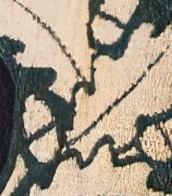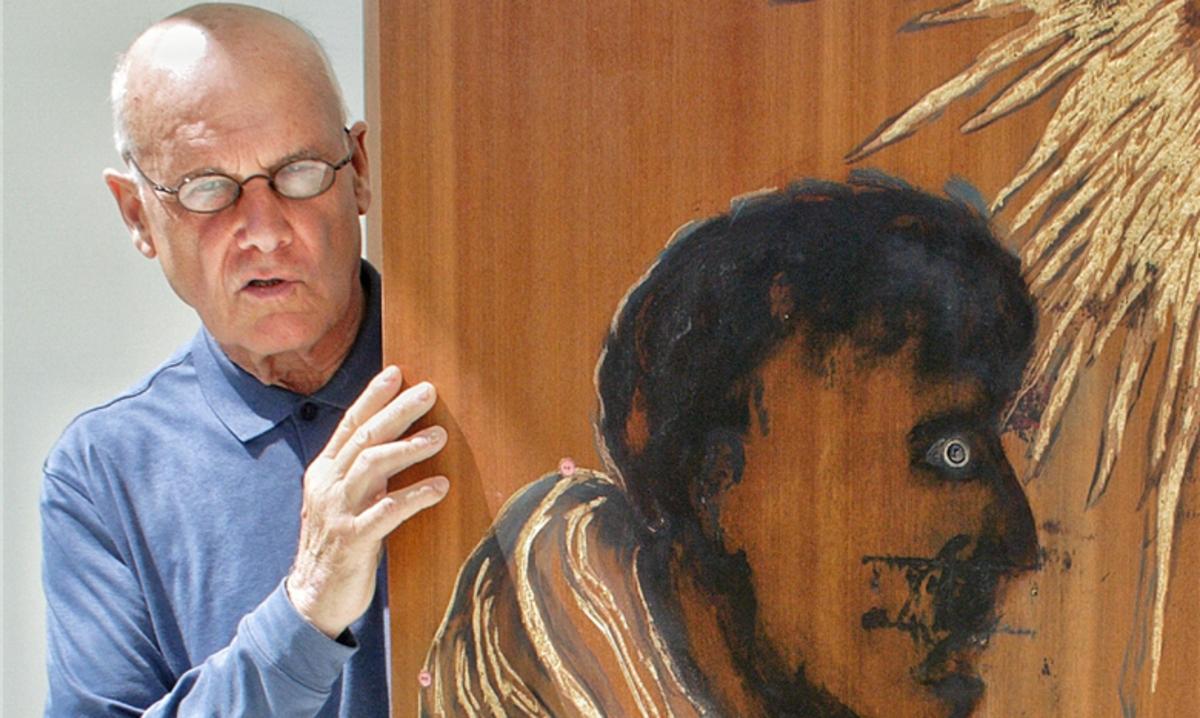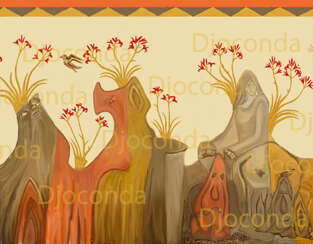105 Items by auctions and galleries:
technics
Lot 5323 A Visor Cap for a Luftwaffe Guide/Instructor of Hitler Youth Pilots Technical Preschool
A106us: A US Lifetime Headgear Collection and other Imperial and WW II Collectibles 

Hermann Historica
A106us: A US Lifetime Headgear Collection and other Imperial and WW II Collectibles
Date: 08.11.2025 14:00 UTC +01:00
Number of lots in the catalog: 511
Swimming under the rain
Daniel Wille (b. 1987)  Shop Wille Daniel
Shop Wille Daniel

Daniel Wille
27.02.1987
Austria
In art I always was seeking for the opportunity to make the viewer feel the picture as something alive, to feel the presence. But not only with the help of classical techniques, or not only with the help of it, but more through associative, subconscious or intuitive.
Using various objects, fabrics, textures, you can create something you can touch to change, something that is exposed to the environment, natural and aging. And that can revive the canvas.
It was always paradoxical for me to feel impressionism more alive comparing to classical realism, I found the key to this answer in Alla prima techniques emotions and admiration are instantly imprinted on the canvas.
Therefore, I try to create work as quick as possible so as not to move out to another environment. To create a good picture you have to live it, survive it.
Even if the picture is not completed, then it will provide an opportunity viewer's imagination.
Everything you can imagine is real.- Picasso.
At recent moment I am working on a new direction "Anrealism".
Born in Samara, Russian Federation.
1987.
Studied interior design and architecture , joined the global art League 2014.
Was exhibiting works in Russia, USA, Israel.
2015 Relocated to Israel, joined the community of artists there.
In 2018 married and relocated to Austria where recently living.
Since childhood, I was surrounded by bunch of books about history of Italian art and architecture, and also most often visited this country with parents who were dealing with fashion boutiques. Grandmother was teacher of piano and singing , given private lessons. So house was fulfilled with atmosphere which motivated me to start creating from age of 3.

Artist shop
Wille Daniel
Austria
Number of products: 21
SERGE LIFAR
Yurii Yermolenko (b. 1973)  Shop Yermolenko Yurii
Shop Yermolenko Yurii

Yurii Yermolenko
02.10.1973
Ukraine
Yury Ermolenko – A Master of Fine Arts (MFA)
Born in 1973 Kiev (Ukraine) Lives and works in Kiev.
Education:
1980 – 1992 – T. Shevchenko Republican art school, Kiev, Ukraine
1992 – 1998 – National Academy of Fine Art and Architecture (NAFAA), Kiev, Ukraine
1998 – 2001 – Post-graduate education ( M.A.degree ), NAFAA, Kiev, Ukraine
2003 – Got a scholarship of Ministry of Culture of Poland ”GOUDE POLONIA”, Krakow, Poland
Main exhibitions:
2018 - "Garden of Wandering Geniuses" project, (Х.Л.А.М.), Kyiv, Ukraine.
2017 – 2018 – “MY FAVOURITE DOLLS” project, Tauvers Gallery international, Kiev, Ukraine
2017 – 2018 – “Flea Psychedelic Market” project, (Х.Л.А.М.), Kyiv, Ukraine
2016 – 2017 – In “Search of Dark Energy”, Vysehrad, Prague, Czech Republic; Hofburg Palace, Vienna, Austria.
2014 – 2015 – “Mу Favorite Dolls”, “Brothers in Arms”
2013 – “Facevinyl”
2013 – “Ukrainian Psychedel”, “Suitcases the Classics”
2013 – “Magical Garden”
2013 – “May be always be my mother, may there always be me”
2012 – “Conversion”
2012 – “Immigration to Cuba”
2011 – “Sings of Cuba”
2011 – “Ladies I didn`t get along with”
2010 – “Metaphysical Landscape of Zaporizhia”
2010 – “Metaphysical Landscape of Kaniv”
2010 – “A hedgehog jazz f**k”
2009 – “Eternal Values”
2009 – “Peruvian Toys”
2008 – “Death of Brands”
2007 – “Pink”
2007 – “Lolita’s on the Arena”
2007 – “Silicon”
2006 – “Paradise”
2006 – “Flea Market”
2005 – "Alice new!"
2005 – “Entomology of Souls”
2004 – "13. ICONOSTASIS"
2004 – “Hunting”
2003 – “KANIV – RAPAN”
2003 – “Baltic – Hel”
THE PROJECTS IN THE ART GROUP "TERRACES":
2002 – “Flash
2001 – “Indigo-Purring Cort”
2000 – “New York City”
2000 – “Flash”
1999 – “So good!”
1998 – “Shout on Plateaus”
1997 – “Dances on Colored Rope”
1997 – “Lighting Art and Painting Art”

Artist shop
Yermolenko Yurii
Ukraine
Number of products: 90
Charlie Parker & Earl Bostic
Yurii Yermolenko (b. 1973)  Shop Yermolenko Yurii
Shop Yermolenko Yurii

Yurii Yermolenko
02.10.1973
Ukraine
Yury Ermolenko – A Master of Fine Arts (MFA)
Born in 1973 Kiev (Ukraine) Lives and works in Kiev.
Education:
1980 – 1992 – T. Shevchenko Republican art school, Kiev, Ukraine
1992 – 1998 – National Academy of Fine Art and Architecture (NAFAA), Kiev, Ukraine
1998 – 2001 – Post-graduate education ( M.A.degree ), NAFAA, Kiev, Ukraine
2003 – Got a scholarship of Ministry of Culture of Poland ”GOUDE POLONIA”, Krakow, Poland
Main exhibitions:
2018 - "Garden of Wandering Geniuses" project, (Х.Л.А.М.), Kyiv, Ukraine.
2017 – 2018 – “MY FAVOURITE DOLLS” project, Tauvers Gallery international, Kiev, Ukraine
2017 – 2018 – “Flea Psychedelic Market” project, (Х.Л.А.М.), Kyiv, Ukraine
2016 – 2017 – In “Search of Dark Energy”, Vysehrad, Prague, Czech Republic; Hofburg Palace, Vienna, Austria.
2014 – 2015 – “Mу Favorite Dolls”, “Brothers in Arms”
2013 – “Facevinyl”
2013 – “Ukrainian Psychedel”, “Suitcases the Classics”
2013 – “Magical Garden”
2013 – “May be always be my mother, may there always be me”
2012 – “Conversion”
2012 – “Immigration to Cuba”
2011 – “Sings of Cuba”
2011 – “Ladies I didn`t get along with”
2010 – “Metaphysical Landscape of Zaporizhia”
2010 – “Metaphysical Landscape of Kaniv”
2010 – “A hedgehog jazz f**k”
2009 – “Eternal Values”
2009 – “Peruvian Toys”
2008 – “Death of Brands”
2007 – “Pink”
2007 – “Lolita’s on the Arena”
2007 – “Silicon”
2006 – “Paradise”
2006 – “Flea Market”
2005 – "Alice new!"
2005 – “Entomology of Souls”
2004 – "13. ICONOSTASIS"
2004 – “Hunting”
2003 – “KANIV – RAPAN”
2003 – “Baltic – Hel”
THE PROJECTS IN THE ART GROUP "TERRACES":
2002 – “Flash
2001 – “Indigo-Purring Cort”
2000 – “New York City”
2000 – “Flash”
1999 – “So good!”
1998 – “Shout on Plateaus”
1997 – “Dances on Colored Rope”
1997 – “Lighting Art and Painting Art”

Artist shop
Yermolenko Yurii
Ukraine
Number of products: 90
Professor Longhair & Art Tatum
Yurii Yermolenko (b. 1973)  Shop Yermolenko Yurii
Shop Yermolenko Yurii

Yurii Yermolenko
02.10.1973
Ukraine
Yury Ermolenko – A Master of Fine Arts (MFA)
Born in 1973 Kiev (Ukraine) Lives and works in Kiev.
Education:
1980 – 1992 – T. Shevchenko Republican art school, Kiev, Ukraine
1992 – 1998 – National Academy of Fine Art and Architecture (NAFAA), Kiev, Ukraine
1998 – 2001 – Post-graduate education ( M.A.degree ), NAFAA, Kiev, Ukraine
2003 – Got a scholarship of Ministry of Culture of Poland ”GOUDE POLONIA”, Krakow, Poland
Main exhibitions:
2018 - "Garden of Wandering Geniuses" project, (Х.Л.А.М.), Kyiv, Ukraine.
2017 – 2018 – “MY FAVOURITE DOLLS” project, Tauvers Gallery international, Kiev, Ukraine
2017 – 2018 – “Flea Psychedelic Market” project, (Х.Л.А.М.), Kyiv, Ukraine
2016 – 2017 – In “Search of Dark Energy”, Vysehrad, Prague, Czech Republic; Hofburg Palace, Vienna, Austria.
2014 – 2015 – “Mу Favorite Dolls”, “Brothers in Arms”
2013 – “Facevinyl”
2013 – “Ukrainian Psychedel”, “Suitcases the Classics”
2013 – “Magical Garden”
2013 – “May be always be my mother, may there always be me”
2012 – “Conversion”
2012 – “Immigration to Cuba”
2011 – “Sings of Cuba”
2011 – “Ladies I didn`t get along with”
2010 – “Metaphysical Landscape of Zaporizhia”
2010 – “Metaphysical Landscape of Kaniv”
2010 – “A hedgehog jazz f**k”
2009 – “Eternal Values”
2009 – “Peruvian Toys”
2008 – “Death of Brands”
2007 – “Pink”
2007 – “Lolita’s on the Arena”
2007 – “Silicon”
2006 – “Paradise”
2006 – “Flea Market”
2005 – "Alice new!"
2005 – “Entomology of Souls”
2004 – "13. ICONOSTASIS"
2004 – “Hunting”
2003 – “KANIV – RAPAN”
2003 – “Baltic – Hel”
THE PROJECTS IN THE ART GROUP "TERRACES":
2002 – “Flash
2001 – “Indigo-Purring Cort”
2000 – “New York City”
2000 – “Flash”
1999 – “So good!”
1998 – “Shout on Plateaus”
1997 – “Dances on Colored Rope”
1997 – “Lighting Art and Painting Art”

Artist shop
Yermolenko Yurii
Ukraine
Number of products: 90
"Волшебный лес" "Magical forest"
Olesya SOBOLEVA (b. 1980)  Shop SOBOLEVA Olesya
Shop SOBOLEVA Olesya

Olesya SOBOLEVA
16.09.1980
Russia
Добрый день! Меня зовут Олеся Дудник- Соболева. Я художник – композитор и поэт.
Моя жизнь – это творчество, которое завораживает, увлекает меня каждую минуту моего существования на земле.
В этом блоге хочу рассказать о своей страсти к живописи.
Пишу картины с детства, притаившись тихо в своей комнате наедине с красками
Живопись – моя страсть. Я рисую и пишу, чтобы выразить свои чувства и мысли, точнее даже ощущения от окружающего мира.
Я работаю в разных стилях и направлениях: реализм, кубизм, абстракцианизм. Иногда меня посещают образы, которые не имеют ничего общего с реальностью, а порой хочется отобразить на холсте, на бумаге простые вещи.
Я хочу в обыкновенном видеть необыкновенное. Стремлюсь передать настроение, впечатление, состояние в каждом портрете и пейзаже.
Ведь в этом и заключается суть художника.

Artist shop
SOBOLEVA Olesya
Russia
Number of products: 8
"Строительство храма" "Church construction"
Olesya SOBOLEVA (b. 1980)  Shop SOBOLEVA Olesya
Shop SOBOLEVA Olesya

Olesya SOBOLEVA
16.09.1980
Russia
Добрый день! Меня зовут Олеся Дудник- Соболева. Я художник – композитор и поэт.
Моя жизнь – это творчество, которое завораживает, увлекает меня каждую минуту моего существования на земле.
В этом блоге хочу рассказать о своей страсти к живописи.
Пишу картины с детства, притаившись тихо в своей комнате наедине с красками
Живопись – моя страсть. Я рисую и пишу, чтобы выразить свои чувства и мысли, точнее даже ощущения от окружающего мира.
Я работаю в разных стилях и направлениях: реализм, кубизм, абстракцианизм. Иногда меня посещают образы, которые не имеют ничего общего с реальностью, а порой хочется отобразить на холсте, на бумаге простые вещи.
Я хочу в обыкновенном видеть необыкновенное. Стремлюсь передать настроение, впечатление, состояние в каждом портрете и пейзаже.
Ведь в этом и заключается суть художника.

Artist shop
SOBOLEVA Olesya
Russia
Number of products: 8
"На вершине" "On top"
Olesya SOBOLEVA (b. 1980)  Shop SOBOLEVA Olesya
Shop SOBOLEVA Olesya

Olesya SOBOLEVA
16.09.1980
Russia
Добрый день! Меня зовут Олеся Дудник- Соболева. Я художник – композитор и поэт.
Моя жизнь – это творчество, которое завораживает, увлекает меня каждую минуту моего существования на земле.
В этом блоге хочу рассказать о своей страсти к живописи.
Пишу картины с детства, притаившись тихо в своей комнате наедине с красками
Живопись – моя страсть. Я рисую и пишу, чтобы выразить свои чувства и мысли, точнее даже ощущения от окружающего мира.
Я работаю в разных стилях и направлениях: реализм, кубизм, абстракцианизм. Иногда меня посещают образы, которые не имеют ничего общего с реальностью, а порой хочется отобразить на холсте, на бумаге простые вещи.
Я хочу в обыкновенном видеть необыкновенное. Стремлюсь передать настроение, впечатление, состояние в каждом портрете и пейзаже.
Ведь в этом и заключается суть художника.

Artist shop
SOBOLEVA Olesya
Russia
Number of products: 8
Motion trough time
Stanislav Kldiashvili (b. 1970)  Shop Kldiashvili Stanislav
Shop Kldiashvili Stanislav

Stanislav Kldiashvili
07.09.1970
Georgia
Since 2001 - Member of Georgian Artistst's Union.
Since 2012 - Member of National Unity of Georgian Artists.Born in 1970, September 7th I was raised in Gori, Georgia. My passion for drawing since childhood has turned into a search path for my whole life. The basics of professionalism were given to me by studying at the M. Tuganov Professional Art School (1984-1984), now occupied by the territory of Georgia, in the city of Tskhinvali (South Ossetian Autonomous Republic). I have been painting professionally for over 30 years. After graduating from college, which also taught me culture, discipline and a certain technique, it was difficult to get out of the technique of academic drawing. This haunted me in my life for another 11 years. All this time I was in shackles, limiting the freedom of my thoughts and creative direction. All this was influenced by the war in South Ossetia, in Abkhazia, which for many centuries of Georgia's existence was a single land for all nations living on the territory of Georgia as one single family.
Trying the technique of drawing in different ways and colors, I managed to free myself from the shackles, radically changing my thinking, method and style of drawing. In 2017, in the composition of some of my paintings on canvas, I added different varieties of wine and watercolors as a background for transparency, quartz sand to obtain a grainy texture, followed by finishing with acrylics. ... Horizontal, vertical lines, roundness and perspective sometimes complement some of my paintings. My paintings are like a calendar of my mood, dreams, feelings, a passion to break free for light, for freedom, which can be seen in the creative process of each of my subsequent paintings. Silently expressing on the canvas step by step what I could not just say in words, thereby leaving the opportunity for any visitor to easily read the meaning of the picture, even with mixed technique and style. Thanks so much for visiting my gallery. Have a pleasant day!

Artist shop
Kldiashvili Stanislav
Georgia
Number of products: 6
"Stranger"
Vladislav Zdor (b. 1994)  Shop Zdor Vladislav
Shop Zdor Vladislav
Vladislav Zdor
21.11.1994
Ukraine
Владислав Здор - украинский художник (1994 г. р.). Родился в Кривом Роге, в 2012 г. поступил в Крымское художественное училище, но в 2014 г. из-за аннексии Крыма Россией был вынужден уехать в Харьков. Закончил Харьковское художественное училище, Киевскую Академию Искусств. Работает преимущественно в стиле реализма, импрессионизма, экспрессионизма в таких жанрах как пейзаж, портрет, натюрморт, ню, военно-историческая картина. Использует различные техники: маслянная живопись, пастель, гуашь, тушь, уголь и др. Владислав находится в постоянном поиске художественных решений и приемов, концептуальных смыслов и идей, которые бы способствовали максимально точной передаче его мироощущения. Участник многих групповых всеукраинских выставок. Живет и работает в Киеве.
Artist shop
Zdor Vladislav
Ukraine
Number of products: 42
"Mother's bouquet"
Vladislav Zdor (b. 1994)  Shop Zdor Vladislav
Shop Zdor Vladislav
Vladislav Zdor
21.11.1994
Ukraine
Владислав Здор - украинский художник (1994 г. р.). Родился в Кривом Роге, в 2012 г. поступил в Крымское художественное училище, но в 2014 г. из-за аннексии Крыма Россией был вынужден уехать в Харьков. Закончил Харьковское художественное училище, Киевскую Академию Искусств. Работает преимущественно в стиле реализма, импрессионизма, экспрессионизма в таких жанрах как пейзаж, портрет, натюрморт, ню, военно-историческая картина. Использует различные техники: маслянная живопись, пастель, гуашь, тушь, уголь и др. Владислав находится в постоянном поиске художественных решений и приемов, концептуальных смыслов и идей, которые бы способствовали максимально точной передаче его мироощущения. Участник многих групповых всеукраинских выставок. Живет и работает в Киеве.
Artist shop
Zdor Vladislav
Ukraine
Number of products: 42
Lot 167 Gustav Kluge. Lippe Bein
Gustav Kluge (1947)  A1282: Galerie Thomas – Part II
A1282: Galerie Thomas – Part II 

Gustav Kluge
07.07.1947
Germany
Gustav Kluge was a German painter and graphic artist and professor of painting.
Kluge studied painting at the Hamburg University of Fine Arts and later taught painting at the State Academy of Fine Arts in Karlsruhe. The artist works and lives in Hamburg and Karlsruhe.
In his works, Kluge deals with fundamental themes: life and death, power and violence. In addition to original inventions, he takes into account various suggestions of historical, cultural and religious traditions. His paintings and drawings, especially his woodcuts, are prime examples of Neo-Expressionism. Using rich material, layered colorful applications, Kluge paints his paintings, as he himself puts it, "on top of each other."

VAN HAM Kunstauktionen GmbH
A1282: Galerie Thomas – Part II
Date: 08.12.2025 17:00 UTC +01:00
Number of lots in the catalog: 146































































